September 20, 2023
23-108
Jessica Pope
Communications and Media Relations Coordinator
VSU’s 2023 Excellence Awards Presented to Distinguished Faculty, Staff
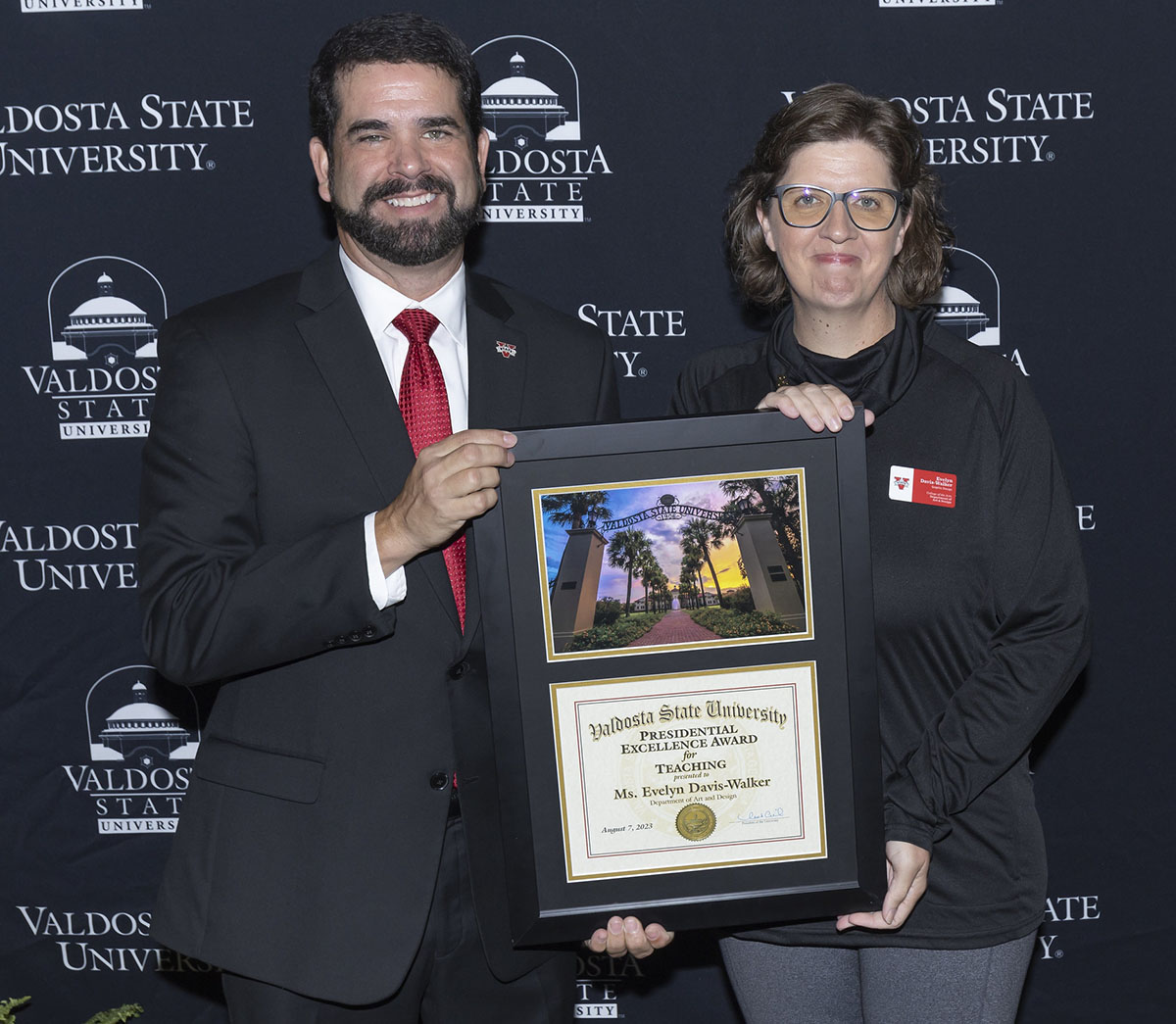
|
|
Evelyn-Davis Walker is the recipient of VSU's 2023 Presidential Excellence Award for Teaching, which recognizes a faculty member who employs innovative teaching strategies and demonstrates a strong commitment to student success. She joined the faculty of VSU’s College of the Arts in 2016 and currently serves as an associate professor of graphic design in the Department of Art & Design.
|
VALDOSTA — Dr. Richard A. Carvajal, president of Valdosta State University, recently honored five faculty members and two staff members with a 2023 Presidential Excellence Award.
The Presidential Excellence Award for faculty is an annual tradition at VSU, one that recognizes the diverse talents and contributions of the university’s innovative and active faculty. Awards are given for excellence in teaching, research, service, online teaching, and scholarship of teaching and learning.
Evelyn Davis-Walker, Presidential Excellence Award for Teaching
The Presidential Excellence Award for Teaching recognizes a faculty member who employs innovative teaching strategies and demonstrates a strong commitment to student success.
Evelyn Davis-Walker joined the faculty of VSU’s College of the Arts in 2016 and currently serves as an associate professor of graphic design in the Department of Art & Design.
VSU: What are your favorite classes to teach and your favorite topics to research?
Davis-Walker: One of my favorite courses to teach is our Storytelling class. In it, my students learn the various forms of visual storytelling through projects such as designing their own children’s books, board games, and stop motion animations. I enjoy teaching students traditional and non-traditional methods of telling a story. Regardless of the course, I find ways of incorporating collaboration, craftsmanship, cross-disciplinary practice, and care with my students in their journey to become lifelong learners.
VSU: What strategies / tools / techniques have proven most effective in increasing student learning in your classroom?
Davis-Walker: I have found experiential learning an extremely effective strategy for my students. I have two separate courses where I have had Quality Enhancement Plan-endorsed activities that have helped increase student engagement with the content as well as with each other as collaborators. With these hands-on activities, students are given agency and ownership with projects that allow them to reflect on the experience and add to their creative process.
VSU: Helping students achieve success often involves countless hours of work outside the classroom. In what ways do you actively engage with your students to continue the learning process outside of scheduled class times?
Davis-Walker: I try to be as accessible to my students as I can while still striking a work and life balance. I use email, office hours, and the chat function within Microsoft TEAMS as a way to keep the lines of communication open. One minor gesture that I think goes a long way is how I allow anyone — whether they are a student of mine or not — to work in the computer lab while I am in there with another class. I never want to slow down someone’s momentum on a project or require them to find another computer lab to work in, especially if that time is the only available hour in their day. My message to those wanting to work outside of scheduled class times is, “If I have an empty seat, you have an open invitation.” I can’t count the number of students that have taken me up on my offer, and who have communicated their appreciation year after year.
VSU: What advice do you have for other faculty who wish to identify more effective ways to stimulate engagement and comprehension in their own classroom?
Davis-Walker: Over the last 18 months, I have worked closely with other amazing faculty on campus as part of a Faculty Learning Community on the pedagogy of care. Our group has been studying current research on the topic as well as identifying ways in which we have naturally integrated care in our classrooms. I truly believe this method of teaching is how I am effectively able to engage my students in our course content and will be even more popular in the years to come.
Dr. José A. Vélez-Marulanda, Presidential Excellence Award for Research
The Presidential Excellence Award for Research recognizes a faculty member with a strong record of creative scholarship.
Dr. José A. Vélez-Marulanda joined the faculty of VSU’s College of Science and Mathematics in 2010 as an assistant professor in the Department of Applied Mathematics and Physics. He was promoted to full professor in 2020.
VSU: What are your favorite classes to teach and your favorite topics to research?
Vélez-Marulanda: There are three classes that I consider my favorite ones. The first is MATH 1112: Trigonometry. I consider this class fundamental for the understanding of many advanced topics in mathematics, and it is fun to teach for you have to use geometry, arithmetic calculations, and technology to understand the topics under discussion. The second one is MATH 2262: Calculus II. This class is essential to understanding many topics in applied sciences, such as probability distributions, financial mathematics, and actuarial mathematics. Finally, my third favorite class to teach is MATH 4110: Number Theory. In this class you get to learn many fascinating things about numbers that you have known since you were in elementary school, but in a deeper way. Furthermore, you also get to realize that there are many things about numbers that are still unknown, and which need to be explored.
My research interests are in the field of representation theory of associative algebras. During many years my research was based on a deformation theory of modules developed by my dissertation adviser, Dr. Frauke M. Bleher at University of Iowa, and by me in my doctoral thesis. I am currently interested in applications of representation theory to topological data analysis, which is fun and useful in many other areas in applied sciences, such as neuroscience, financial mathematics, and silica glasses. You also get to implement your results in programs like Python and R. I am also interested in methods from machine learning in statistical risk modeling.
VSU: Why do you believe it is important for faculty to conduct research and contribute new knowledge to their fields?
Vélez-Marulanda: I feel I need to do research in order to learn new ways of looking at a specific situation. For example, people in topological data analysis realized not a long time ago that many results from representation theory of algebras were extremely useful to them in order to obtain new results. People in my area of research found through this connection that our results were actually useful for real-life applications, which is great. I also feel that by doing research you will have a better understanding of what is of interest and what needs to be done in the academic world. I think that when you create new results, you also enhance the prestige of your institution, as well as the networking of collaborators, which in turn increases the chances for your students to be admitted in graduate programs, or in other ones like research experiences for undergraduates or internships.
VSU: How many publications, presentations, and other scholarship have you completed? What drives you to find time outside of teaching, mentoring, and serving the university to conduct this research?
Vélez-Marulanda: I have so far 15 articles that are published in academic journals, such as Journal of Algebra, Journal of Pure and Applied Algebra, and Proceedings of the American Mathematical Society. I had the opportunity of giving research talks all over the United States, Canada, Colombia, Mexico, and Ecuador. I had the opportunity of successfully co-advising the Doctor of Philosophy thesis of three graduate students at the Universidad de Antioquia in Colombia. I have co-organized four research conferences, one sponsored by the Centre International de Mathématiques Pures et Appliquées (CIMPA) organization in France, and another one by the National Science Foundation. I try to be very organized with my time, and being a workaholic helps a lot to find spaces to get things done. However, there are two main factors that motivate me to do research. One is mathematical curiosity, and the other is an enjoyment for learning new things.
VSU: What advice do you have for other faculty who wish to get more involved in research?
Vélez-Marulanda: It is important to have conversations with your peers about what you have in mind to get explored. Organizing departmental seminars or colloquia can provide a perfect place for such conversations. Sponsoring undergraduate research projects can also bring new ideas and motivation for getting bigger results. One major factor that can discourage research is when you get your article rejected or when you get highly critical reviews by the referees, which has happened to me many times in the past and can still happen to me in the future. If you have to deal with this type of situation, you can try what I usually do — take some days off from doing research to “lick your wounds,” do what you like the most to clear your mind (e.g. yoga, walking, or in my case, playing your favorite video game), spend a lot of time with your loved ones, and then, when you feel ready, go again over your article by implementing the constructive criticism provided by the referees, fix the typos, etc., and submit your article again to a suitable journal.
Sarah Wildes Arnett, Presidential Excellence Award for Service
The Presidential Excellence Award for Service recognizes a faculty member who has demonstrated a strong and consistent commitment to service at VSU and to the community.
Sarah Wildes Arnett joined the faculty of VSU’s College of the Arts in 2012 and currently serves as professor of dance and interim head of the Department of Communication Arts.
VSU: What are your favorite classes to teach? What are your favorite research topics?
Arnett: I am a studio-based practitioner in dance, and I love to be in the studio working with students on their artistry as performers, choreographers, and creators. My favorite courses to teach at VSU are Aerial Dance Arts, Choreography, and Dance Conditioning and Wellness. It is important to me for students to find their voice and what makes them feel powerful in their art.
My research is creative research. I am a professional choreographer and performer. I am at my best when collaborating on performance projects like musicals, dance performance pieces, and dance films.
VSU: Teaching, mentoring, performing, and choreographing are already full-time jobs. What motivates you to make time for service?
Arnett: I see the impact that the service has on my students directly. As artists, we generally are giving of our time and protective of those we work. By serving in organizations like the American College Dance Association, I can give back to organizations that showed me that the arts can be a viable career choice. My motivation for serving within the VSU and Valdosta community comes down to a return on investment. I feel that if I buy in and show my peers, students, and the community that I am invested in VSU, then it gives them a reason to also be invested.
VSU: As an artist, what does service look like to you?
Arnett: This is a really hard question to answer because my service looks so different than many others. Yes, I’ve served on committees and more traditional looking service opportunities, but I also have worked as a recruiter, coordinated auditions, led workshops in the community, and advised student organizations. I’ve offered my professional services as a performer and master class instructor, and I’ve choreographed for fundraisers, all in an effort to raise funds, increase visibility for the arts, and enrich the community. I’m constantly in flux with service. My largest task this past year was serving as the chair of the Social Media Committee for the American College Dance Association, where I ran multiple fundraising campaign projects, coordinated student takeovers for 13 regional festivals, organized the marketing for the National College Dance Festival, and generated the public programs for the National Gala Concerts. I offer what I feel I can contribute when I see a need.
VSU: What advice do you have for other faculty who want to make time for service?
Arnett: Go where your heart leads you. It took me some time to understand why service is important and why I would want to give my time to something or someone without payment. I think it’s important to reflect and see what you have to offer and how those skills can enhance the community around you. I am where I am today because of the generosity and service of individuals that taught me. I hope that modeling service in this way can inspire my students to give back, be willing to collaborate, and be caring citizens in whatever they choose to do. Balance is always hard, but if you find things that mean something and where you can see the impact, it makes a huge difference.
Dr. Victoria Russell, Presidential Excellence Award for The Scholarship of Teaching and Learning
The Presidential Excellence Award for The Scholarship of Teaching and Learning recognizes a faculty member who produces innovative scholarly work on the science of teaching and learning and regularly contributes new knowledge on the subject.
Dr. Victoria Russell joined the VSU faculty in 2010 and currently serves as a professor in the Department of Modern and Classical Languages in the College of Humanities and Social Sciences. She primarily teaches courses in Foreign Language Education and English for Speakers of Other Languages at the master’s degree level, but she also teaches Spanish online at the bachelor’s degree level.
VSU: What are your favorite classes to teach and your favorite topics to research?
Russell: I really love all of the classes that I teach. Our VSU students are phenomenal, and it is a privilege to work with them every single day. However, if I had to pick a favorite class, it would be Second Language Acquisition Theory and Practice. I earned my doctorate in this discipline, and I absolutely love to help my teacher candidates bridge research and practice. In other words, this course helps them engage in highly effective research-based practices in their current or future classrooms. Many of our teacher candidates are currently teaching on temporary or provisional certificates. Therefore, they are learning how to teach while they are in the classroom working as practitioners. They often report that what they learn through their graduate-level world language education classes helps them survive and thrive as Georgia K-12 educators.
VSU: Why do you believe it is important for teachers to do the work necessary to keep their class content interesting and relevant to new generations of students?
Russell: This is perhaps the most important aspect of being an effective teacher. We must continue to grow, develop, and learn in our field year after year. I have been able to do this by being highly engaged in professional organizations. For example, I served on the board of directors for the Southern Conference on Language Teaching (SCOLT) from 2018 to 2022, and I served on the American Council of Teaching Foreign Languages (ACTFL) board as president elect in 2021, president in 2022, and immediate past president this year (in 2023). Through my professional service, I have been able to meet, interact with, and engage in research with top scholars in my field from across the country and the world. This has enabled me to maintain my passion for my discipline, which translates directly into my day-to-day teaching.
VSU: What strategies / tools / techniques have proven most effective in increasing student learning in your classroom?
Russell: I will keep this answer short and sweet. There are three secrets for helping students succeed:
No. 1: Show and tell your students how much you care for them and their success in your classroom and beyond.
No. 2: Keep the lines of communication open by being available for meetings, answering emails in a timely manner, and creating help discussion boards on BlazeVIEW where they can give and receive help from each other and from their instructor daily.
No. 3: Provide detailed and timely feedback on student work. Students need to understand how they can improve, and they need clear guidance on how to do so.
VSU: What drives your research / scholarly work in the field of teaching and learning?
Russell: My research informs my teaching, and my professional service organizations provide a platform to disseminate my research. Through these three prongs — teaching, research, and service — I have been able to continue to learn and grow as a professional educator. Moreover, I engage my students in professional service and research. For example, I have published with my students in academic journals, brought them to professional conferences to present with me, taken them to study overseas through my VSU-sponsored summer study abroad program in Cádiz, Spain, and, of course, sponsored their work at the VSU undergraduate and graduate research symposia, which are always the highlight of the academic year for me.
VSU: What advice do you have for other faculty who wish to identify more effective ways to stimulate engagement and comprehension in their own classroom?
Russell: Take advantage of the many opportunities that VSU offers for faculty development, engage in professional organizations, and get to know your students outside of the classroom. For me, spending several weeks abroad with students in the summer is a powerful way to get to know them and their struggles on a deep level. I am in awe of my students and all that they have overcome to reach their academic goals. When I think about that, I am inspired to bring, give, and do my best for my students every single day.
Dr. Colette Drouillard, Presidential Excellence Award for Online Teaching
The Presidential Excellence Award for Online Teaching recognizes a faculty member who demonstrates a strong commitment to quality online teaching and learning, employs innovative online teaching practices, and develops rapport with individual learners in and beyond the virtual classroom.
Dr. Colette Drouillard joined the faculty of VSU’s James L. and Dorothy H. Dewar College of Education and Human Services in 2010 and currently serves as an associate professor in the Department of Library and Information Studies.
VSU: What are your favorite classes to teach and your favorite topics to research?
Drouillard: My favorite classes to teach are those focused on youth services in public libraries — literature for children, literature for young adults, multicultural literature. But I’ve also had amazing experiences with courses focused on electronic resources for youth where my students have focused on development of programs in coding and computation thinking for children in their libraries as well as designing those programs in ways that best enable them to obtain grants to support the programs. Most recently, I’ve added a course on genre fiction for adult readers that focuses on development of readers’ advisory skills. I’m looking forward to using some of the elements from this course in my youth literature courses.
VSU: What strategies / tools / techniques have proven most effective in increasing student learning in your online classroom?
Drouillard: Creatively motivating interaction and discussions are essential. This summer’s adult genre fiction course was greatly enhanced through the students taking turns leading the discussion in a book club style — simulating something they would do with adult reading groups in their libraries — as well as collaborating with several of our Odum librarians to develop a genre fiction display as well as the content for the related website. The results this summer were wonderful!
VSU: When it comes to developing a meaningful rapport with your online students, how do you ensure that your students feel actively engaged in and satisfied with their online learning experience?
Drouillard: I do my best to maintain an open and friendly relationship. It can be a challenge since in most cases we never meet our students face to face until they arrive for graduation. One of the things that I try to make clear is that I’m aware that each of them knows more than I do about something that we will be doing in every class and being very clear that I’m open to them sharing their experiences or making suggestions for ways that we can improve either the content or the activities/assignments in any of the courses that I instruct. Almost all the successful aspects of my courses have evolved as a result of input from prior students — either their recommendations or their input on one of my crazy ideas that helped develop it into something even better than I’d initially envisioned.
VSU: What advice do you have for other faculty who wish to identify more effective ways to stimulate engagement and comprehension in their own online classroom?
Drouillard: Listen to what your students are saying or asking about. With an asynchronous course, we don’t have the same facial cues that are so essential in face-to-face courses, cues that allow us to see that what we’re presenting makes sense or doesn’t make sense. It’s up to us to try to tease out signs based on what our students are, or aren’t, saying in the discussions or including in their assignments, and then trying to adapt what we’re doing to better meet their needs or interests.
***
The Presidential Excellence Award for staff is also an annual tradition at VSU, one that recognizes the high standards of service, initiative, reliability, professional attitude, exemplary job performance, and leadership of the university’s dedicated staff.
Sandra Y. G. Jones, Presidential Excellence Award for Classified Staff
Sandra Y. G. Jones joined the VSU staff in 2016 and currently serves as deputy chief officer of student engagement, a role that requires her to oversee a number of areas within the Division of Enrollment and Student Affairs, including Student Diversity and Inclusion, Student Life, Career Opportunities and Volunteer Services, Campus Recreation, the Student Union, and more.
As a member of various diversity committees, Jones works to ensure VSU is an inclusive community that promotes open communication and collaboration and offers a learning and working environment that is supportive, healthy, engaging, inspiring, and challenging for all. She also presides over two campus initiatives — SPARK, an extended orientation-style program that helps students navigate college life, and Blazer Ready, a leadership and skill development program.
VSU: This award recognizes the high standards of service, initiative, reliability, professional attitude, exemplary job performance, and leadership of the university’s dedicated staff. What advice do you have for VSU’s fall graduates and young alumni who wish to demonstrate excellence in their current / future professional roles?
Jones: I try to exemplify excellence as a standard for myself. That does not mean I always get the outcome that I expect, but I can always be proud of the effort that goes into my work. You will have bad moments, but don’t give them too much energy. Recover quickly. Most importantly, allow positivity to fuel your joy. Resist negative energy bandits.
Rebecca Taylor, Presidential Excellence Award for Classified Staff
Rebecca Taylor joined the VSU staff in 1999 and currently serves as deputy chief officer of student support services, a role that requires her to oversee a number of areas within the Division of Enrollment and Student Affairs, including University Advising, Office of Testing, Student Success and Retention, and Access Office. She also volunteers as a campus advisor for the Kappa Delta Chapter of Phi Beta Sigma Fraternity Inc. and a campus advisor for the Black Student League.
VSU: This award recognizes the high standards of service, initiative, reliability, professional attitude, exemplary job performance, and leadership of the university’s dedicated staff. What advice do you have for VSU’s fall graduates and young alumni who wish to demonstrate excellence in their current / future professional roles?
Taylor: As an employee at VSU for over 24 years I would have to say that being flexible and having a willingness to change are important — and always be willing to provide exceptional service at all times. The ups and downs will occur, but it’s important to always keep a spirt of excellence for those we serve.
On the Web:
https://www.valdosta.edu/academics/academic-affairs/presidential-excellence-awards.php
https://www.valdosta.edu/administration/council-on-staff-affairs/staff-excellence-awards.php
Newsroom
- Office of Communications Powell Hall West, Suite 1120
-
Mailing Address
1500 N. Patterson St.
Valdosta, GA 31698 - General VSU Information
- Phone: 229.333.5800
- Office of Communications
- Phone: 229.333.2163
- Phone: 229.333.5983
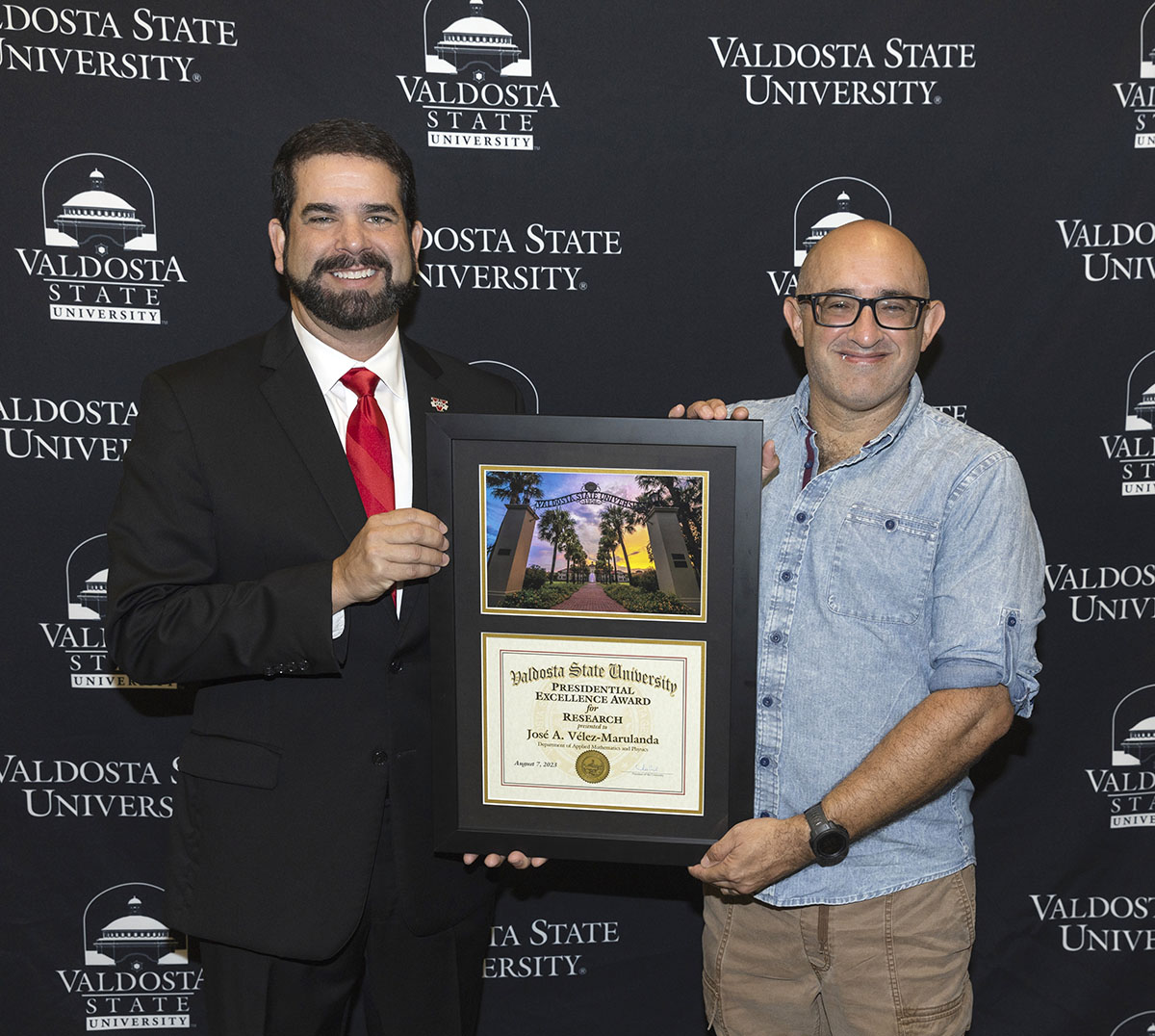 Dr. José A. Vélez-Marulanda is the recipient of VSU's 2023 Presidential Excellence Award for Research, which recognizes a faculty member with a strong record of creative scholarship. He joined the faculty of VSU’s College of Science and Mathematics in 2010 as an assistant professor in the Department of Applied Mathematics and Physics. He was promoted to full professor in 2020.
Dr. José A. Vélez-Marulanda is the recipient of VSU's 2023 Presidential Excellence Award for Research, which recognizes a faculty member with a strong record of creative scholarship. He joined the faculty of VSU’s College of Science and Mathematics in 2010 as an assistant professor in the Department of Applied Mathematics and Physics. He was promoted to full professor in 2020.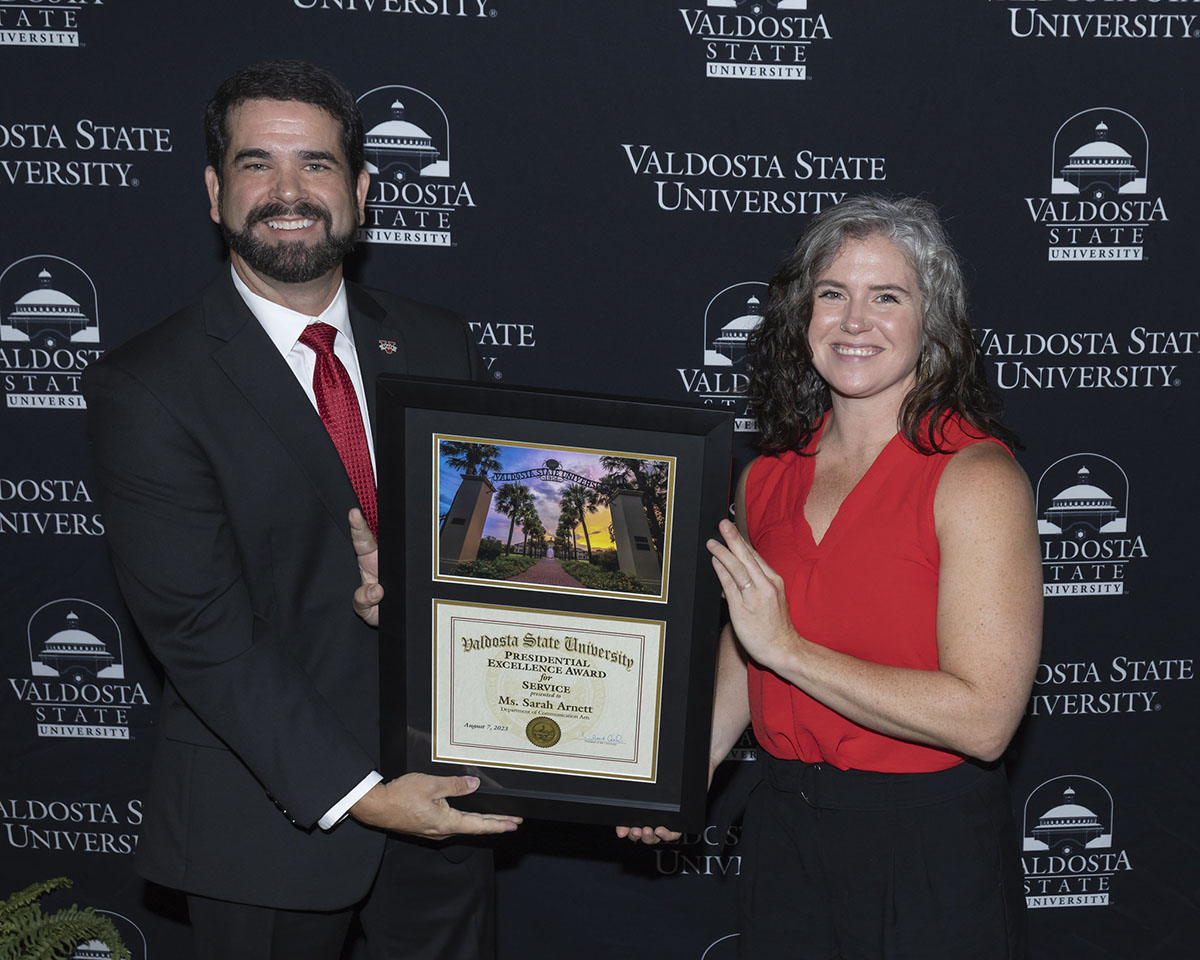 Sarah Wildes Arnett is the recipient of VSU's 2023 Presidential Excellence Award for Service, which recognizes a faculty member who has demonstrated a strong and consistent commitment to service at VSU and to the community. She joined the faculty of VSU’s College of the Arts in 2012 and currently serves as professor of dance and interim head of the Department of Communication Arts.
Sarah Wildes Arnett is the recipient of VSU's 2023 Presidential Excellence Award for Service, which recognizes a faculty member who has demonstrated a strong and consistent commitment to service at VSU and to the community. She joined the faculty of VSU’s College of the Arts in 2012 and currently serves as professor of dance and interim head of the Department of Communication Arts.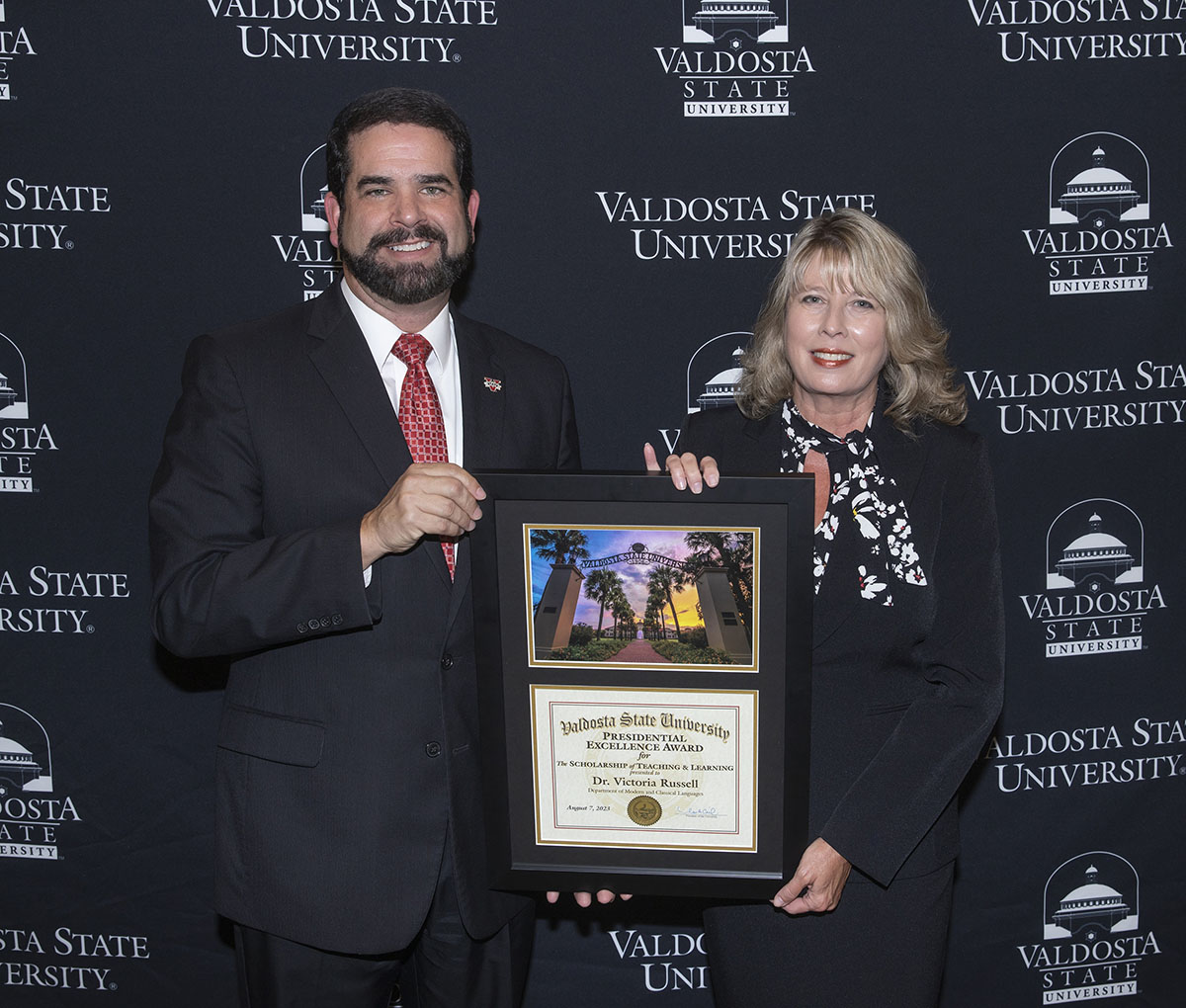 Dr. Victoria Russell is the recipient of VSU's 2023 Presidential Excellence Award for The Scholarship of Teaching and Learning, which recognizes a faculty member who produces innovative scholarly work on the science of teaching and learning and regularly contributes new knowledge on the subject. She joined the VSU faculty in 2010 and currently serves as a professor in the Department of Modern and Classical Languages in the College of Humanities and Social Sciences. She primarily teaches courses in Foreign Language Education and English for Speakers of Other Languages at the master’s degree level, but she also teaches Spanish online at the bachelor’s degree level.
Dr. Victoria Russell is the recipient of VSU's 2023 Presidential Excellence Award for The Scholarship of Teaching and Learning, which recognizes a faculty member who produces innovative scholarly work on the science of teaching and learning and regularly contributes new knowledge on the subject. She joined the VSU faculty in 2010 and currently serves as a professor in the Department of Modern and Classical Languages in the College of Humanities and Social Sciences. She primarily teaches courses in Foreign Language Education and English for Speakers of Other Languages at the master’s degree level, but she also teaches Spanish online at the bachelor’s degree level.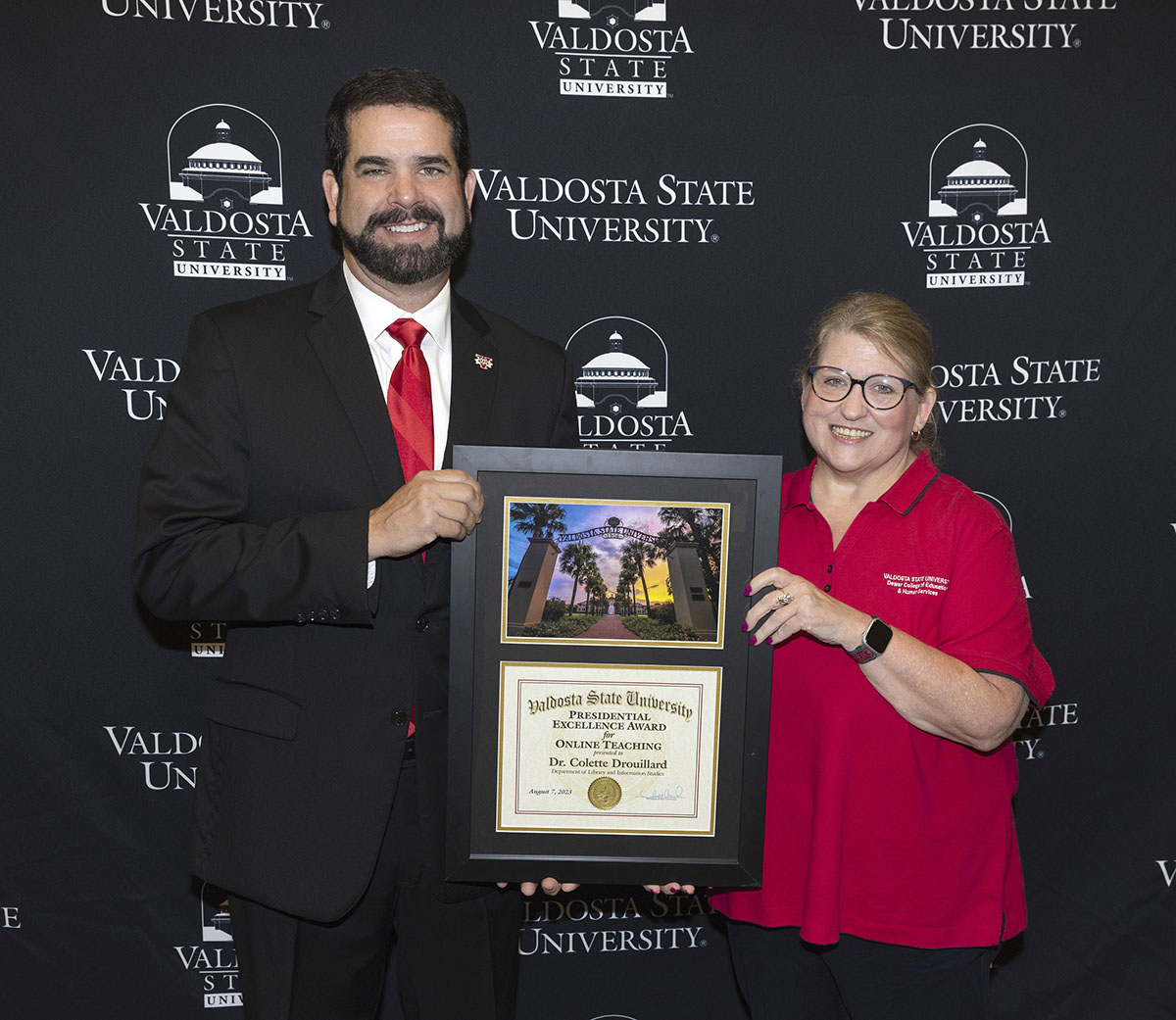 Dr. Colette Drouillard is the recipient of VSU's 2023 Presidential Excellence Award for Online Teaching, which recognizes a faculty member who demonstrates a strong commitment to quality online teaching and learning, employs innovative online teaching practices, and develops rapport with individual learners in and beyond the virtual classroom. She joined the faculty of VSU’s James L. and Dorothy H. Dewar College of Education and Human Services in 2010 and currently serves as an associate professor in the Department of Library and Information Studies.
Dr. Colette Drouillard is the recipient of VSU's 2023 Presidential Excellence Award for Online Teaching, which recognizes a faculty member who demonstrates a strong commitment to quality online teaching and learning, employs innovative online teaching practices, and develops rapport with individual learners in and beyond the virtual classroom. She joined the faculty of VSU’s James L. and Dorothy H. Dewar College of Education and Human Services in 2010 and currently serves as an associate professor in the Department of Library and Information Studies.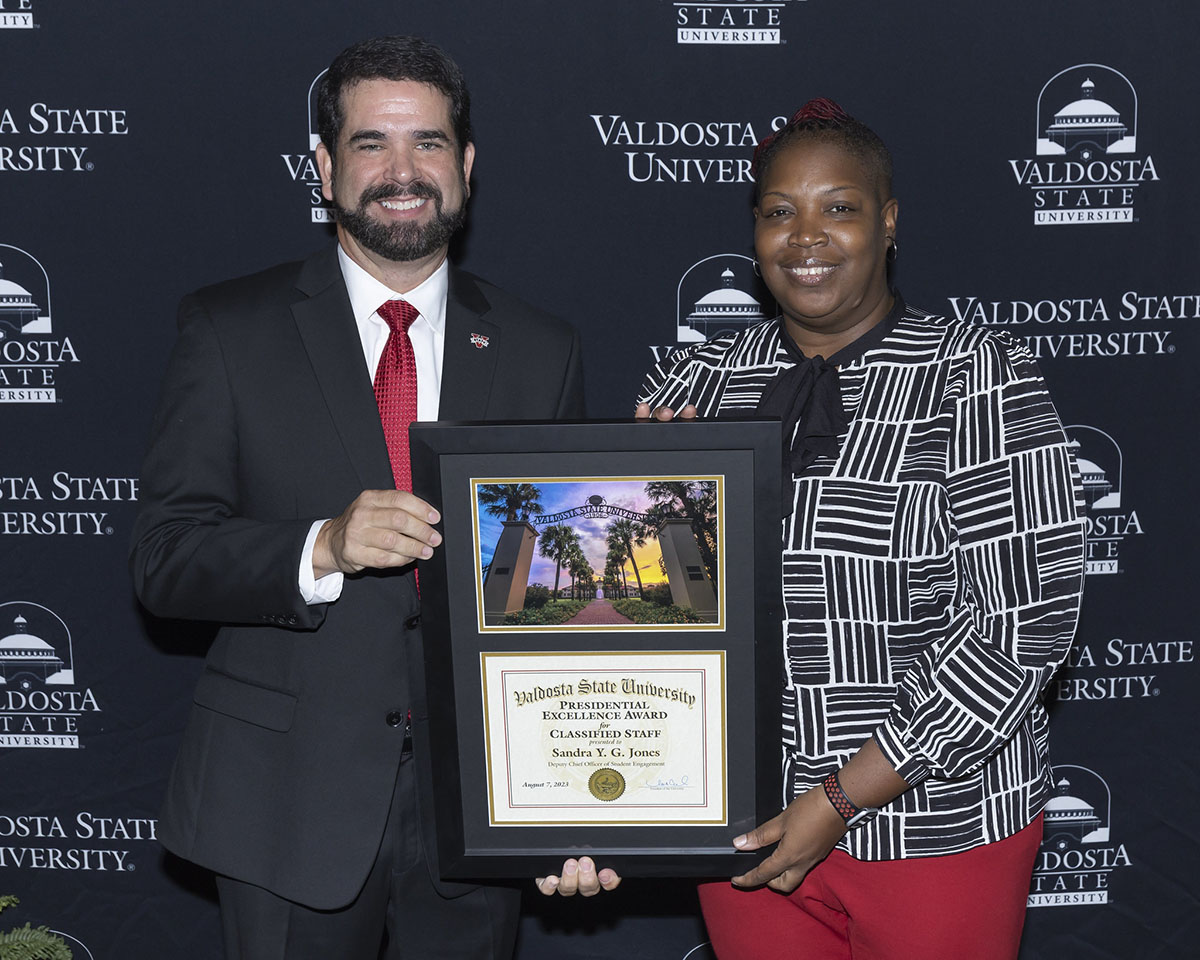 Sandra Y. G. Jones is the recipient of VSU's 2023 Presidential Excellence Award for Classified Staff. She joined the VSU staff in 2016 and currently serves as deputy chief officer of student engagement, a role that requires her to oversee a number of areas within the Division of Enrollment and Student Affairs, including Student Diversity and Inclusion, Student Life, Career Opportunities and Volunteer Services, Campus Recreation, the Student Union, and more.
Sandra Y. G. Jones is the recipient of VSU's 2023 Presidential Excellence Award for Classified Staff. She joined the VSU staff in 2016 and currently serves as deputy chief officer of student engagement, a role that requires her to oversee a number of areas within the Division of Enrollment and Student Affairs, including Student Diversity and Inclusion, Student Life, Career Opportunities and Volunteer Services, Campus Recreation, the Student Union, and more.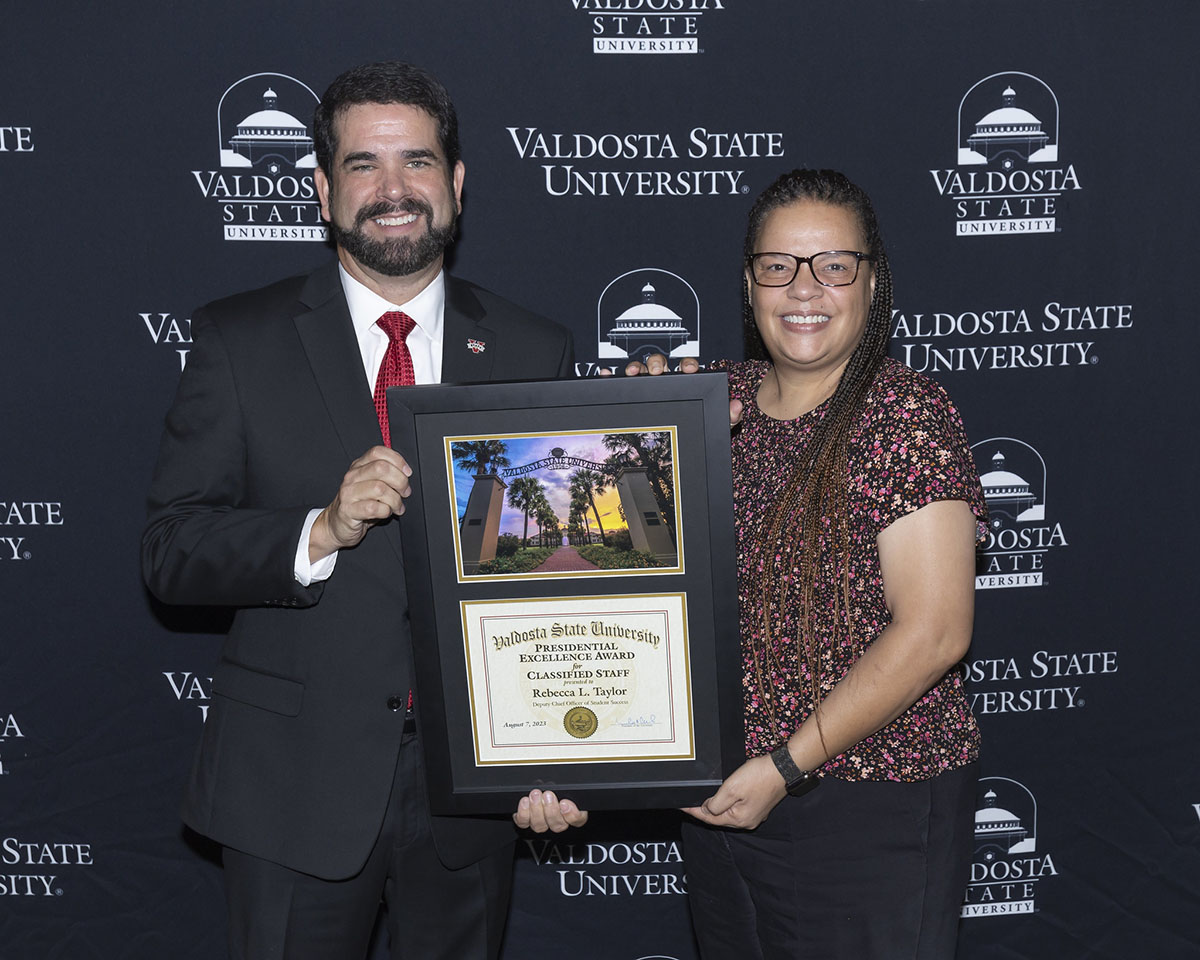 Rebecca Taylor is the recipient of VSU's 2023 Presidential Excellence Award for Classified Staff. She joined the VSU staff in 1999 and currently serves as deputy chief officer of student support services, a role that requires her to oversee a number of areas within the Division of Enrollment and Student Affairs, including University Advising, Office of Testing, Student Success and Retention, and Access Office.
Rebecca Taylor is the recipient of VSU's 2023 Presidential Excellence Award for Classified Staff. She joined the VSU staff in 1999 and currently serves as deputy chief officer of student support services, a role that requires her to oversee a number of areas within the Division of Enrollment and Student Affairs, including University Advising, Office of Testing, Student Success and Retention, and Access Office.